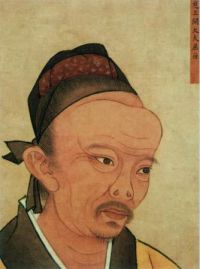Difference between revisions of "Li Sao"
From Wiki China org cn
imported>Ciic |
|||
| (2 intermediate revisions by 2 users not shown) | |||
| Line 1: | Line 1: | ||
| − | '''Li | + | '''Li Sao''' (离骚''The Lament'') was the longest poem in ancient [[China]]. In the first part of the poem, [[Qu Yuan]] expressed his fervent concern over the fate of the State of Chu, as well as hopes for political reforms. In the second part, the patriotic author described the quest, sorrow and disillusionment of an exiled minister of state. |
| − | The poem carries typical features of romanticism in its structural magnificence, literary grace, mythic allusions, and imaginative analogy like the beauty and vanilla. The poem was so great that people identified the "Style of Li | + | The poem carries typical features of romanticism in its structural magnificence, literary grace, mythic allusions, and imaginative analogy like the beauty and vanilla. The poem was so great that people identified the "Style of Li Sao," which had profound influence on later poetry. |
[[category:literature]] | [[category:literature]] | ||
[[File:Facsimile of Li Sao.jpg|thumb|200px|Facsimile of Li Sao]] | [[File:Facsimile of Li Sao.jpg|thumb|200px|Facsimile of Li Sao]] | ||
[[File:Portrait of Qu Yuan.jpg|thumb|200px|Portrait of Qu Yuan]] | [[File:Portrait of Qu Yuan.jpg|thumb|200px|Portrait of Qu Yuan]] | ||
Latest revision as of 05:06, 1 December 2009
Li Sao (离骚The Lament) was the longest poem in ancient China. In the first part of the poem, Qu Yuan expressed his fervent concern over the fate of the State of Chu, as well as hopes for political reforms. In the second part, the patriotic author described the quest, sorrow and disillusionment of an exiled minister of state.
The poem carries typical features of romanticism in its structural magnificence, literary grace, mythic allusions, and imaginative analogy like the beauty and vanilla. The poem was so great that people identified the "Style of Li Sao," which had profound influence on later poetry.

